|
|
|
Sort Order |
|
|
|
Items / Page
|
|
|
|
|
|
|
| Srl | Item |
| 1 |
ID:
146121
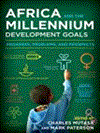

|
|
|
|
|
| Publication |
Lanham, Rowman and Littlefield, 2015.
|
| Description |
vi, 248p.pbk
|
| Standard Number |
9781442256255
|
|
|
|
|
|
|
|
|
|
|
|
Copies: C:1/I:0,R:0,Q:0
Circulation
| Accession# | Call# | Current Location | Status | Policy | Location |
| 058725 | 338.96/MUT 058725 | Main | On Shelf | General | |
|
|
|
|
| 2 |
ID:
029180


|
|
|
|
|
| Publication |
New York, McGraw-Hill Book Company, 1971.
|
| Description |
xii, 239p.Hbk
|
| Standard Number |
070353158
|
|
|
|
|
|
|
|
|
|
|
|
Copies: C:1/I:0,R:0,Q:0
Circulation
| Accession# | Call# | Current Location | Status | Policy | Location |
| 008294 | 658.3125/KOO 008294 | Main | On Shelf | General | |
|
|
|
|
| 3 |
ID:
144680
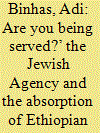

|
|
|
|
|
| Summary/Abstract |
This article addresses the question of how the Israeli government and the Jewish Agency for Israel (JAFI) handled the absorption of Ethiopian immigrants in the early 1990s. It shows that, reflecting the historic rivalry between the two organizations, their interaction lacked a clear division of roles and was mired by rivalry and conflicting interests. As a result, the individual immigrant, besides dealing with predictable absorption difficulties, had to cope with bureaucratic failures.
|
|
|
|
|
|
|
|
|
|
|
|
|
|
|
|
| 4 |
ID:
099423
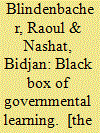

|
|
|
|
|
| Publication |
Washington, DC, World Bank, 2010.
|
| Description |
xx, 181p.
|
| Standard Number |
9780821384534
|
|
|
|
|
|
|
|
|
|
|
|
Copies: C:1/I:0,R:0,Q:0
Circulation
| Accession# | Call# | Current Location | Status | Policy | Location |
| 055311 | 352.669/BLI 055311 | Main | On Shelf | General | |
|
|
|
|
| 5 |
ID:
166296
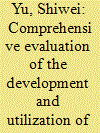

|
|
|
|
|
| Summary/Abstract |
This study proposes comprehensive evaluation criteria, involving aspects of energy, economy, environment, technology, and society (E3TS), for the development and utilization of renewable energy (RE). The criteria consist of 22 indicators. The comprehensive performance, from 2011 to 2015, of 30 provincial regions in China with respect to renewable energy development and utilization (REDU) was evaluated on the basis of the E3TS criteria, using an analytic network process (ANP). The results show that the total comprehensive performance (2011–2015) of all the 30 provincial regions of China improved in general. There was a marked improvement in technology performance. Qinghai, Yunnan, and Sichuan ranked the top three in comprehensive performance of REDU, while the comprehensive performance of Shaanxi, Hainan, and Henan were the lowest. During the study period, while the comprehensive performance of most provincial regions such as Ningxia and Xinjiang increased, that of five provincial regions, including Tianjin and Hainan, decreased. The regional comprehensive performance was severely affected by the installed capacity and power generation of RE.
|
|
|
|
|
|
|
|
|
|
|
|
|
|
|
|
| 6 |
ID:
169926


|
|
|
|
|
| Summary/Abstract |
Scientific knowledge on what works in countering violent extremism remains limited. This article argues that we should move away from the “what works?” question and towards: “what works, for whom, in what circumstances, and how?” This method is also known as realist evaluation. This article applies the realist review method to CVE studies, which synthesizes the existing CVE literature and helps us gain insight into relevant contexts, mechanisms, and outcomes for CVE. Realist reviews help to develop and shape more effective policy and contribute to further CVE theory development.
|
|
|
|
|
|
|
|
|
|
|
|
|
|
|
|
| 7 |
ID:
159968
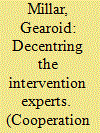

|
|
|
|
|
| Summary/Abstract |
The failures of peace interventions are often associated with their exogenously conceived and technocratic nature, which discount complexity within and diversity between post-conflict contexts. In response, scholars have resorted to concepts of empowerment, resistance, hybridity and friction to refocus post-conflict policymaking away from ‘top-down’ and towards ‘bottom-up’ processes. Any such efforts, however, require that policymakers understand the local drivers and everyday experiences of peace interventions across a range of cases, a task for which the current tools of the intervention experts have proven unsuited. This article, therefore, proposes an Ethnographic Peace Research (EPR) agenda that would provide access for and influence to the ‘peace kept’ and decentre the intervention experts in peacebuilding policy. In its effort to influence policy, however, an EPR agenda faces substantial challenges. These include, among others, the failure of academics to communicate clearly to non-academic audiences, the ideological biases of policymakers and the relentless simplification of complexity. However, as will be discussed and evidenced using a variety of cases below, an EPR approach also has a number of strengths that can enhance its relevance for policy, serve to decentre the intervention experts and develop a credible alternative bottom-up approach to policymaking in post-conflict states.
|
|
|
|
|
|
|
|
|
|
|
|
|
|
|
|
| 8 |
ID:
099324
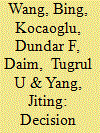

|
|
|
|
|
| Publication |
2010.
|
| Summary/Abstract |
This paper evaluates coal, petroleum, natural gas, nuclear energy and renewable energy resources as energy alternatives for China through use of a hierarchical decision model. The results indicate that although coal is still the major preferred energy alternative, it is followed closely by renewable energy. The sensitivity analysis indicates that the most critical criterion for energy selection is the current energy infrastructure. A hierarchical decision model is used, and expert judgments are quantified, to evaluate the alternatives. Criteria used for the evaluations are availability, current energy infrastructure, price, safety, environmental impacts and social impacts.
|
|
|
|
|
|
|
|
|
|
|
|
|
|
|
|
| 9 |
ID:
065716


|
|
|
| 10 |
ID:
103920
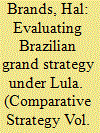

|
|
|
|
|
| Publication |
2011.
|
| Summary/Abstract |
This article analyzes Brazilian grand strategy under President Luiz Inacio Lula da Silva. During Lula's eight years in office, he pursued a multitiered grand strategy aimed at hastening the transition from U.S. and Western hegemony to a multipolar order more favorable to Brazilian interests. Lula did so by emphasizing three diplomatic strategies: soft balancing, coalition building, and seeking to position Brazil as the leader of a more united South America. During Lula's time in office, this strategy successfully raised Brazil's profile and increased its diplomatic flexibility, but the country still faces several potent strategic dilemmas that could complicate or undermine its geopolitical ascent.
|
|
|
|
|
|
|
|
|
|
|
|
|
|
|
|
| 11 |
ID:
117248
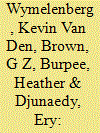

|
|
|
|
|
| Publication |
2013.
|
| Summary/Abstract |
This paper documents the direct energy savings and energy efficiency market transformation impacts of a multi-state design assistance program in the northwestern US. The paper addresses four specific aims. (1) It provides a conservative and justified estimate of the direct energy savings associated with design assistance activities of a market transformation program from 2001 to 2010. (2) It provides a rigorous methodology to evaluate direct energy savings associated with design assistance market transformation programs. (3) It provides a low-cost replicable method to predict energy savings in new buildings by evaluating the integrated design process. (4) It provides quantitative indicators useful for estimating indirect energy savings from market transformation. Applying the recommended analysis method and assuming a 12-year measure life, the direct energy savings of the population (626 buildings; 51,262,000 ft2) is estimated as 45.3 aMW (average megawatts) (electric), and 265,738.089 therms (non-electric). If the entire program budget were divided into the electric savings only, the Lab Network cost per kWh saved ranged from $0.0016 to $0.003 using the recommended method and $0.0092/kWh using the most conservative method. These figures do not isolate contextual influences or represent total resource cost. Statistically significant correlations (r2=0.1-0.3) between integrated design scores and energy savings are reported.
|
|
|
|
|
|
|
|
|
|
|
|
|
|
|
|
| 12 |
ID:
091215
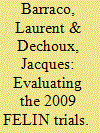

|
|
|
|
|
| Publication |
2009.
|
| Summary/Abstract |
The industrial experiments showed that the main FELIN's functionalities are operationally validated both at individual level and at squad and platon level. FELIN is currently being evaluated in the framework of the technical operational evaluation (EVTO).
|
|
|
|
|
|
|
|
|
|
|
|
|
|
|
|
| 13 |
ID:
191034
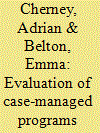

|
|
|
|
|
| Summary/Abstract |
There currently exists little evidence on the effectiveness of case-managed programs targeting radicalised individuals. This paper provides results from an evaluation of two case-managed interventions implemented by police in Australia, referred to as Intervention 1 and Intervention 2. Drawing on client case note data and interviews, the paper provides quantitative and qualitative results. It examines client change using a five-point metric and details two individual case studies. Results provide data on radicalised behaviours, intervention goals and services offered to clients. Individual client progress is explored, and the overall effectiveness of both programs examined. The results show a positive relationship between client change and different measures of engagement. Limitations of the evaluation methodology and data sources are acknowledged and addressed. Lessons are highlighted relating to the assessment of client change, program evaluation and the role of interventions in supporting disengagement.
|
|
|
|
|
|
|
|
|
|
|
|
|
|
|
|
| 14 |
ID:
137633
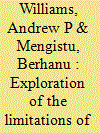

|
|
|
|
|
| Summary/Abstract |
This article seeks to unpack the implications of contemporary peacebuilding for technocratic, bureaucratic organizational forms. It argues that if the contemporary peacebuilding literature is taken as given, fundamental alterations are required in predominately Western peacebuilding systems—specifically in the structure and function of bureaucratic organizations that typically fund, manage and execute peacebuilding interventions. The analysis proceeds by matching five ‘peacebuilding principles’ derived from contemporary literature, with an organizational framework that highlights key structural and functional aspects of bureaucracies, thus allowing organizational deficiencies to be identified. The article argues that current peacebuilding scholarship would benefit from theoretically guided organizational research on the various organizations and systems involved in peacebuilding implementation. It concludes that peacebuilding scholars can be informed by the significant body of knowledge in the fields of public administration and policy, which bring a rich history of studying implementation situations that parallel in many ways complex peacebuilding interventions.
|
|
|
|
|
|
|
|
|
|
|
|
|
|
|
|
| 15 |
ID:
089729
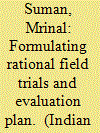

|
|
|
|
|
| Publication |
2009.
|
| Summary/Abstract |
India's defence procurement procedure is based on single-stage two bid system. It entaisl submission of technical and commercial proposals by the invited vendors at the outset, albeit in two separate sealed covers. Technical proposals are opened initially whereas commercial proposals are kept sealed in safe custody. Indian FT&E regime suffers from a total lack of advance planning . No comprehensive FT&E plan is evolved in advance. It is the primary reason for most of the infirmities that plague technical appraisal process.
|
|
|
|
|
|
|
|
|
|
|
|
|
|
|
|
| 16 |
ID:
147519
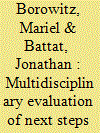

|
|
|
|
|
| Summary/Abstract |
There is a growing consensus among stakeholders around the world that the long-term objective of human space exploration is the long-duration presence of humans on the surface of Mars. However, the key question concerns the choice of near-term missions that will bridge current human spaceflight activities in low Earth orbit (LEO) and eventual Mars exploration. This paper contributes to this debate by identifying the scope of possible near-term missions, arguing that there are only four realistic proposals for initial human exploration beyond low Earth orbit: a cis-lunar habitat, asteroid redirect, Mars flyby, and a short lunar surface sortie. The paper then evaluates these missions across five criteria: 1) technical/economic feasibility, 2) contribution to the eventual goal of exploring Mars, 3) potential for international cooperation, 4) global readiness for the mission, and 5) political feasibility to establish a clear assessment of the pros and cons of each of these four missions. While recognizing that any one of these missions represents a feasible option for future human space exploration, we recommend that the international community pursue development of a cis-lunar habitat as its immediate goal. This mission maximizes development of technology necessary for Mars exploration, provides significant opportunities for meaningful international participation, and could be achieved on a reasonable schedule with current budgets. Both the asteroid redirect mission and lunar exploration plans have the potential to benefit from the development of a cis-lunar habitat and could be retained as intermediate or parallel missions, as resources allow.
|
|
|
|
|
|
|
|
|
|
|
|
|
|
|
|
| 17 |
ID:
084276
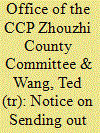

|
|
|
| 18 |
ID:
152300
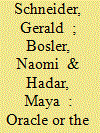

|
|
|
|
|
| Summary/Abstract |
The forecasting literature has come to mistrust the predictions made by experts who forecast political events in mass media. Distinguishing between judgements made by one or few individuals (‘oracles’) and assessments made by larger groups (‘crowds’), we contrast journalistic predictions with forecasts stemming from the financial industry. These two competing views were evaluated in a quantitative analysis of the ex ante success of 24 ceasefire agreements in various conflicts which took place in the Levant from 1993 to 2014. Our analysis compares the forecasts appearing in press commentaries (Haaretz, Jerusalem Post and New York Times) with the expectations that the Tel Aviv Stock Exchange had about the stability of these cooperative efforts. To evaluate the predictions of these very dissimilar sources, the effectiveness of the ceasefires was analysed through the number of violent events following the official start of the truce. The analysis shows that the financial industry performs better than the media industry in the comparative evaluation of ceasefire forecasts, but that neither source provides sufficiently accurate predictions. The partial support for the crowd thesis is discussed in light of recent literature that resuscitates the usage of well-trained experts for forecasting purposes, but warns against the dramatizing predictions of media pundits.
|
|
|
|
|
|
|
|
|
|
|
|
|
|
|
|
| 19 |
ID:
153339
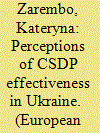

|
|
|
|
|
| Summary/Abstract |
This article makes a contribution to the little explored issue of evaluating the effectiveness of the EU Common Security and Defence Policy (CSDP). Drawing on the interviews with local beneficiaries of two missions in Ukraine, one CSDP proper (European Union Advisory Mission) and the other a “hybrid” mission (EU Border Assistance Mission), the article analyses which factors shape the local beneficiaries’ perception of a mission being effective or non-effective. It shows the reputational approach deriving from the organisational theory can offer a fruitful theoretical framework for understanding CSDP perceived effectiveness on the ground. The article contributes to the studies of CSDP and its engagement with the host state as well as to the nascent academic and policy literature on CSDP and Ukraine.
|
|
|
|
|
|
|
|
|
|
|
|
|
|
|
|
| 20 |
ID:
113457
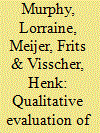

|
|
|
|
|
| Publication |
2012.
|
| Summary/Abstract |
Climate change policies in the Netherlands recognise the importance of existing dwellings. Efforts to gain these energy savings are led at national level by policy instruments such as the Energy Performance Certificate, covenants, economic and information tools. These instruments reflect a policy style described as consensus based and incentivising. However, this approach has been subject to criticism with suggestions that alternatives are required. As a first step towards conceptualising alternatives previous evaluations and stakeholder interviews are used to assess instruments. Elements from the theory based evaluation method combined with concepts from policy instrument and energy policy literature form an evaluation framework. Results demonstrate weak impact of some key instruments. Underlying theories associated with instruments are often lost during implementation or remain unsubstantiated. Policy instrument and energy policy concepts are evident but are far from pervasive. Results show that current instruments are poorly equipped to forge a long-term energy saving strategy for existing dwellings. It is further demonstrated that complexity with existing dwellings is not only limited to frequently cited barriers but to the intricacies of designing and operating a well-orchestrated instrument mix.
|
|
|
|
|
|
|
|
|
|
|
|
|
|
|
|
|
|
|
|
|